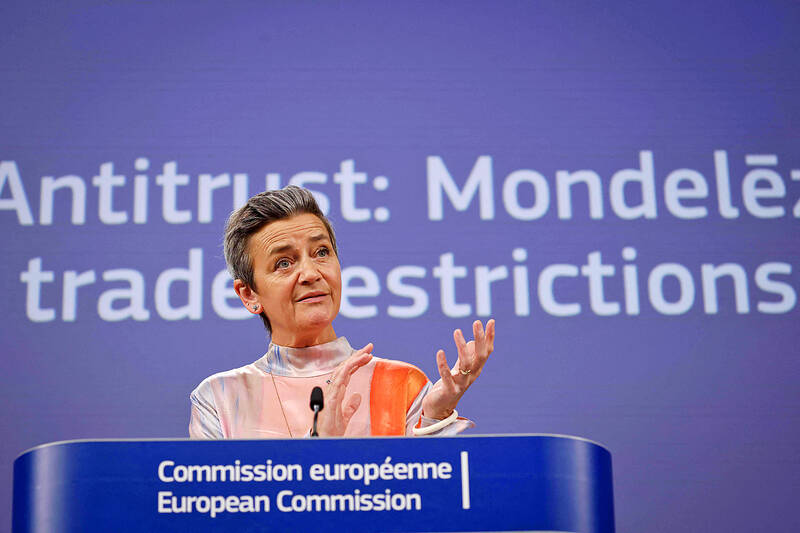Eight EU states urged Brussels on Friday to clamp down on multinational giants unfairly limiting the sale of products within the bloc, forcing European consumers to pay more.
Their call comes a day after the European Commission slapped a 337.5 million euro (US$366 million) antitrust fine on Mondelez International Inc, the US confectioner behind major brands including Toblerone and Oreo, for restricting cross-border sales of chocolate.
The cost of living is a hot topic ahead of EU-wide elections next month as European households have been hit hard by soaring consumer prices following the COVID-19 pandemic and Russia’s war on Ukraine.

Photo: AFP
Inflation has slowed down since its peak in late 2022, but food costs remain high.
Several EU countries believe addressing unfairness in the single market is one way to help struggling consumers.
Eight EU governments led by the Netherlands said there are price differences for the same products within the EU and Brussels “should take action,” because big multinational companies were limiting the sale of goods in the EU’s single market.
The seven others named in joint paper are: Belgium, Croatia, the Czech Republic, Denmark, Greece, Luxembourg and Slovakia. The issue was on Friday discussed during a meeting of EU ministers in Brussels.
EU Commissioner for Competition Margrethe Vestager said Brussels would start with a “fact-finding mission” and then “figure out what tools are actually necessary in order to prevent territorial restrictions that make prices rise where they shouldn’t.”
The commission, the EU’s antitrust watchdog, would work with member states to find a solution, she told reporters after the meeting.
The constraints cost EU consumers more than 14 billion euros a year, the eight countries said, pointing to an estimate from a 2020 commission study.
Greek Prime Minister Kyriakos Mitsotakis also urged the EU to crack down on giant firms at the weekend in a letter to European Commission President Ursula von der Leyen.
The free movement of goods is one of the key pillars of the EU’s single market.
“Removing trade barriers should be a key priority for the single market. This helps in keeping consumer retail prices for food and non-food products fair. Something which is especially important in times of high consumer prices,” Dutch Minister of Economic Affairs and Climate Policy Micky Adriaansens said.
The eight states propose “a concrete way forward towards an EU ban” on restricting the exchange of goods within the bloc “by amending existing or new common EU rules or instruments,” she added.
The concerns are not new. In 2019, Brussels fined the world’s largest brewer Anheuser-Busch InBev NV 200 million euros for hindering cheaper beer imports into Belgium from the Netherlands.

In Italy’s storied gold-making hubs, jewelers are reworking their designs to trim gold content as they race to blunt the effect of record prices and appeal to shoppers watching their budgets. Gold prices hit a record high on Thursday, surging near US$5,600 an ounce, more than double a year ago as geopolitical concerns and jitters over trade pushed investors toward the safe-haven asset. The rally is putting undue pressure on small artisans as they face mounting demands from customers, including international brands, to produce cheaper items, from signature pieces to wedding rings, according to interviews with four independent jewelers in Italy’s main

Japanese Prime Minister Sanae Takaichi has talked up the benefits of a weaker yen in a campaign speech, adopting a tone at odds with her finance ministry, which has refused to rule out any options to counter excessive foreign exchange volatility. Takaichi later softened her stance, saying she did not have a preference for the yen’s direction. “People say the weak yen is bad right now, but for export industries, it’s a major opportunity,” Takaichi said on Saturday at a rally for Liberal Democratic Party candidate Daishiro Yamagiwa in Kanagawa Prefecture ahead of a snap election on Sunday. “Whether it’s selling food or

CONCERNS: Tech companies investing in AI businesses that purchase their products have raised questions among investors that they are artificially propping up demand Nvidia Corp chief executive officer Jensen Huang (黃仁勳) on Saturday said that the company would be participating in OpenAI’s latest funding round, describing it as potentially “the largest investment we’ve ever made.” “We will invest a great deal of money,” Huang told reporters while visiting Taipei. “I believe in OpenAI. The work that they do is incredible. They’re one of the most consequential companies of our time.” Huang did not say exactly how much Nvidia might contribute, but described the investment as “huge.” “Let Sam announce how much he’s going to raise — it’s for him to decide,” Huang said, referring to OpenAI

The global server market is expected to grow 12.8 percent annually this year, with artificial intelligence (AI) servers projected to account for 16.5 percent, driven by continued investment in AI infrastructure by major cloud service providers (CSPs), market researcher TrendForce Corp (集邦科技) said yesterday. Global AI server shipments this year are expected to increase 28 percent year-on-year to more than 2.7 million units, driven by sustained demand from CSPs and government sovereign cloud projects, TrendForce analyst Frank Kung (龔明德) told the Taipei Times. Demand for GPU-based AI servers, including Nvidia Corp’s GB and Vera Rubin rack systems, is expected to remain high,